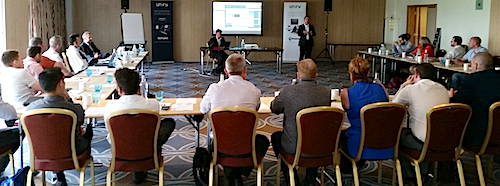Daisy Group has positioned itself as the first scaled UK-based UC and IT infrastructure managed services provider capable of reaching £1bn annual revenue following the completion of its acquisition of Phoenix IT Group.
The deal adds more than 3,600 businesses to the Daisy customer base and brings particular strength in the education, retail and financial services markets.
Phoenix is a good fit with Daisy's corporate and partner businesses, serving the Group's mid-market customer base with a broader portfolio and enhancing its offering to system integrator partners.
Underpinning this will be Phoenix's expertise in Business Continuity and IT Service Continuity Management as well as scale in key market growth areas in hybrid cloud and field services.
The complementary product sets provide cross-selling opportunities and significant economies of scale, enabling Daisy to provide both its existing customers and the customers of Phoenix with access to additional services.
The addition of Phoenix extends the scale and range of white label services in the Daisy Daisy Partner Services portfolio, in particular in desk-side and retail support, such that the portfolio now spans the breadth of traditional and contemporary Unified Communications and IT Infrastructure.
Matthew Riley, Daisy Group founder and Executive Chairman commented: "Throughout our development it has been important that Daisy continues to evolve in line with market dynamics and alongside the specific needs of customers in a rapidly changing marketplace.
"The worlds of Unified Communications and IT Services are rapidly converging and our customers and partners are asking us to provide a broader range of services under one roof.
"As such, our ambition is to be the leading provider of unified business communications and IT infrastructure managed services and solutions via our SMB, Corporate and Partner Services businesses in the UK - a marketplace we believe to be worth over £10billion per annum.
"For the last decade we have been consolidating the fragmented market and the acquisition of Phoenix is evidence of Daisy's intent to provide its customers and partners with a truly holistic service."
Neil Muller, Daisy Group CEO commented: "Through a combination of Daisy's strength in networking and unified communications and Phoenix's heritage in IT Services, we believe the enlarged group will occupy a unique position in the market.
?"As businesses become more digital there is an ever-increasing reliance on the management and availability of customers' business communications and IT Infrastructure.
"By combining capabilities, we are well positioned to offer true differentiation to our mid-market customers, providing them with a breadth of solutions and expertise, ensuring their critical systems are 'always on'.
"Likewise, for our partners serving enterprise customers, our scaled partner services division will allow us to add value through both our enhanced expertise and engineering support, with a commitment that we will collaborate with our partners at all times.
"Over the coming weeks and months we will be combining the core strengths of both businesses, and we believe that the enlarged Group will become the 'go to' provider for end-to-end Unified Communications and IT Infrastructure Managed Services and solutions."

 An upgrade to GCI Channel Solutions' Customer Control Portal (CCP) gives partners with their own reseller base a 'Parent Child' facility, enabling their customers to deploy to end users directly via self-serve.
An upgrade to GCI Channel Solutions' Customer Control Portal (CCP) gives partners with their own reseller base a 'Parent Child' facility, enabling their customers to deploy to end users directly via self-serve. A record number of guests attended Channel Telecom's annual golf day held at the West Essex Golf Club which boasts views across London and is home to the smallest green in the country.
A record number of guests attended Channel Telecom's annual golf day held at the West Essex Golf Club which boasts views across London and is home to the smallest green in the country. A charity golf event hosted by Sennheiser in aid of the Caron Keating Foundation raised £15,000, taking the total amount raised by the company in support of cancer charities to over £500k.
A charity golf event hosted by Sennheiser in aid of the Caron Keating Foundation raised £15,000, taking the total amount raised by the company in support of cancer charities to over £500k. Members of Unify's senior management team flew in from across Europe to update a full house of resellers attending a 'masterclass' event staged by Nimans at the Oxford Belfry Hotel.
Members of Unify's senior management team flew in from across Europe to update a full house of resellers attending a 'masterclass' event staged by Nimans at the Oxford Belfry Hotel. Huawei Deputy Chairman and Rotating CEO Ken Hu has called for deeper and more rapid innovation to develop 5G technology as virtual reality and other applications create the need for greater network bandwidth.
Huawei Deputy Chairman and Rotating CEO Ken Hu has called for deeper and more rapid innovation to develop 5G technology as virtual reality and other applications create the need for greater network bandwidth.